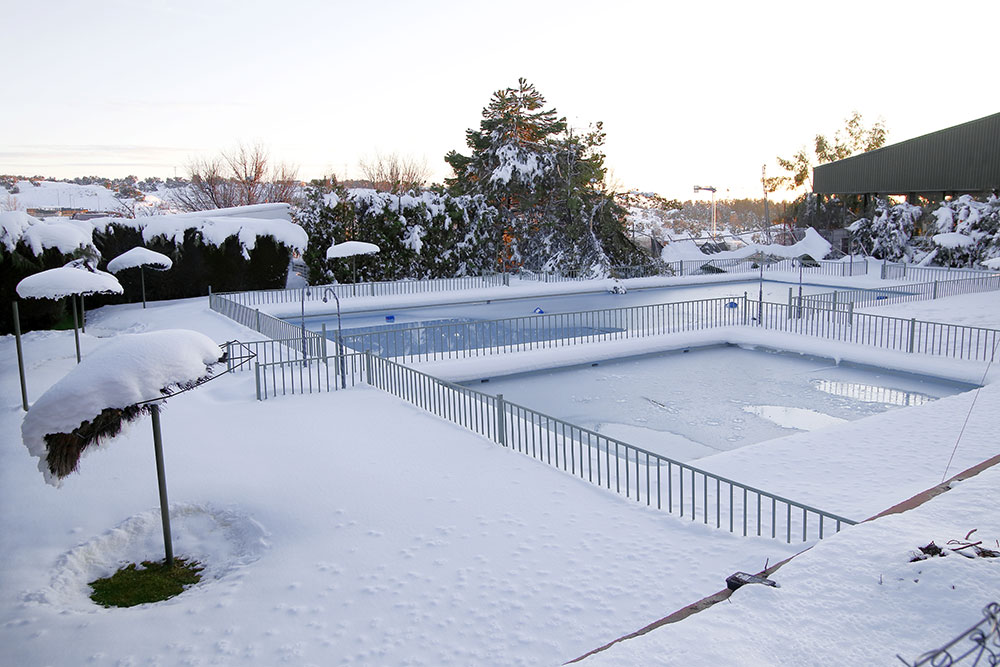As the winter months approach, pool owners in cooler climates must take essential steps to protect their pools from the damaging effects of freezing temperatures. One crucial aspect of this preparation is the process of winterizing pools, which involves blowing out and plugging lines. This preventive measure ensures that the pool’s plumbing and equipment are safeguarded against the potential hazards of cold weather. Here’s why properly winterizing pools is so important:
1. Preventing Freezing Damage
Water left in the plumbing lines of a pool can freeze during winter. As water freezes, it expands, and this expansion can cause significant damage to the pool’s pipes, fittings, and equipment. Cracked pipes and damaged fittings can lead to expensive repairs and potential water loss. By removing all water from the plumbing system, winterizing effectively prevents these issues, ensuring that the pool remains intact and functional when warmer weather returns.
2. Cost-Effective Protection
Though the process of winterizing, including blowing out lines, may seem time-consuming, it is a cost-effective measure that can save pool owners significant expenses in the long run. The costs associated with repairing or replacing damaged plumbing and equipment far outweigh the time and effort spent on proper winterization. By investing in this preventive maintenance, pool owners can avoid the financial burden of unexpected repairs.
3. Complete Water Removal
Simply draining the pool is not enough to ensure complete water removal from the system. Blowing out the lines with air is a thorough method that guarantees all water is expelled from the pipes. This comprehensive removal provides superior protection against freezing compared to partial drainage, as even a small amount of residual water can cause damage if it freezes.
4. Complementary Use of Antifreeze
In addition to blowing out the lines, adding antifreeze to the system provides an extra layer of protection. Antifreeze helps to prevent any remaining moisture from freezing, offering additional security against the harsh effects of winter. This step is especially crucial for areas of the plumbing that may be challenging to dry completely, such as low spots in the pipes.
5. Adaptability to Climate Changes
As climate patterns become increasingly unpredictable, regions that typically experience mild winters may still face occasional freezing temperatures. Winterizing pools is an adaptable solution that protects against unexpected cold snaps, ensuring that pool systems are safe regardless of weather fluctuations. This adaptability is particularly important in areas where homeowners may not traditionally consider winterization a necessity.
6. Essential for Inground Pools
Inground pools have permanent plumbing systems that are vulnerable to freezing damage. Unlike above-ground pools, which can be disassembled and stored during the winter, inground pools require comprehensive winterization to protect their built-in systems. Blowing out the lines and plugging them securely is crucial to safeguarding these permanent installations.
7. Preservation of Pool Equipment
Proper winterization extends beyond just protecting the plumbing lines; it also preserves the longevity of the pool’s equipment. Pumps, filters, and other components are at risk of damage if water is allowed to freeze inside them. By thoroughly removing water and ensuring all parts are winterized, pool owners can maintain the efficiency and lifespan of their equipment, reducing the need for replacements or extensive repairs.
FAQs
1. What does it mean to “winterize” a pool?
Answer: Winterizing a pool involves preparing it for the cold winter months by removing water from the plumbing lines, adding antifreeze, and securing the pool to prevent damage from freezing temperatures. This process protects the pool’s plumbing and equipment from potential damage caused by frozen water expansion.
2. Why is blowing out the lines necessary when winterizing a pool?
Answer: Blowing out the lines ensures that all water is removed from the pool’s plumbing system. Any water left in the lines can freeze and expand, potentially cracking pipes and causing significant damage. This step is crucial for preventing costly repairs.
3. Can I just drain my pool instead of blowing out the lines?
Answer: Draining the pool alone is not sufficient to protect the plumbing system. Blowing out the lines ensures that no water remains in the pipes, providing better protection against freezing. Simply draining the pool does not remove water from the plumbing lines, which can still freeze and cause damage.
4. Is it necessary to use antifreeze after blowing out the lines?
Answer: While blowing out the lines removes most water, adding antifreeze provides extra protection against any residual moisture that may remain. Antifreeze prevents any leftover water from freezing and damaging the system, offering an additional layer of security.
5. Do I need to winterize my pool if I live in a region with mild winters?
Answer: Even in regions with mild winters, unexpected freezing temperatures can occur. Winterizing your pool is a precautionary measure that protects against potential damage. It ensures that your pool and its equipment are safe, regardless of unpredictable weather patterns.
Conclusion
Winterizing pools is an essential practice for pool owners in cooler climates. By blowing out and plugging the lines, and using antifreeze as an additional safeguard, pool owners can protect their valuable investment from the harsh effects of winter. This process not only prevents freezing damage but also saves money on potential repairs, adapts to changing climate conditions, and preserves the longevity of pool equipment. Proper winterization ensures that pools are ready for use when the warm weather returns, providing peace of mind and financial savings.

